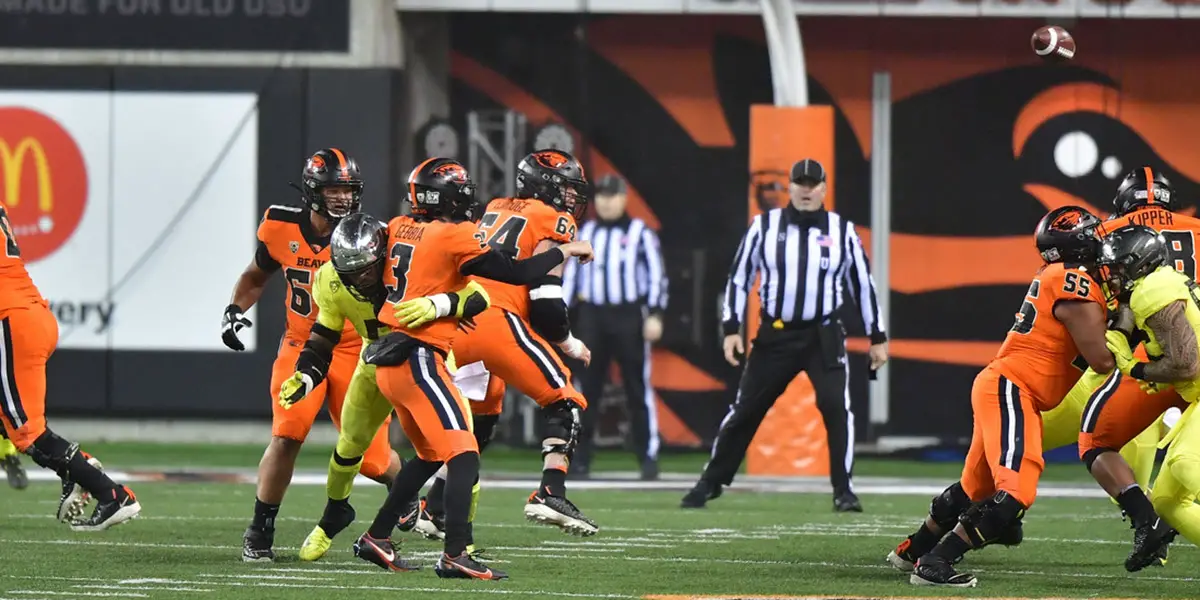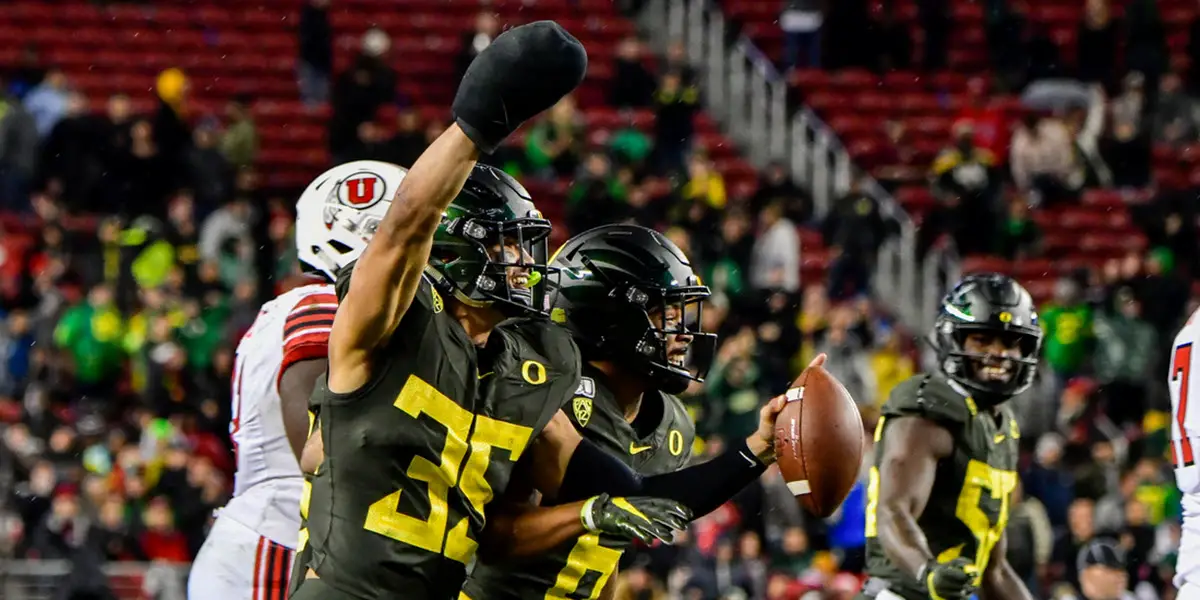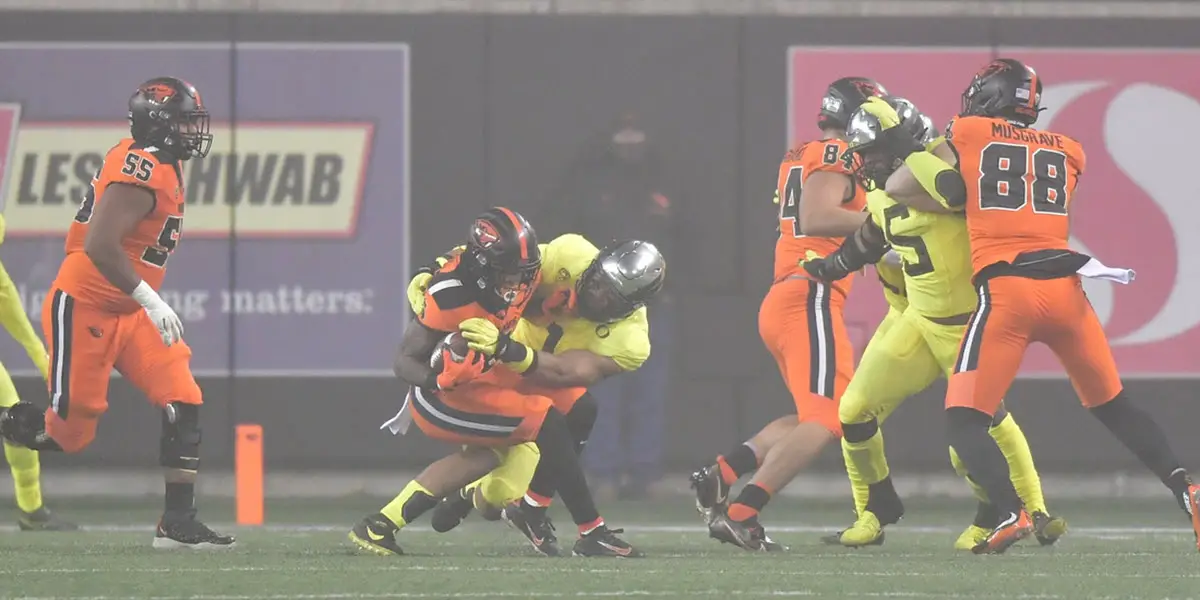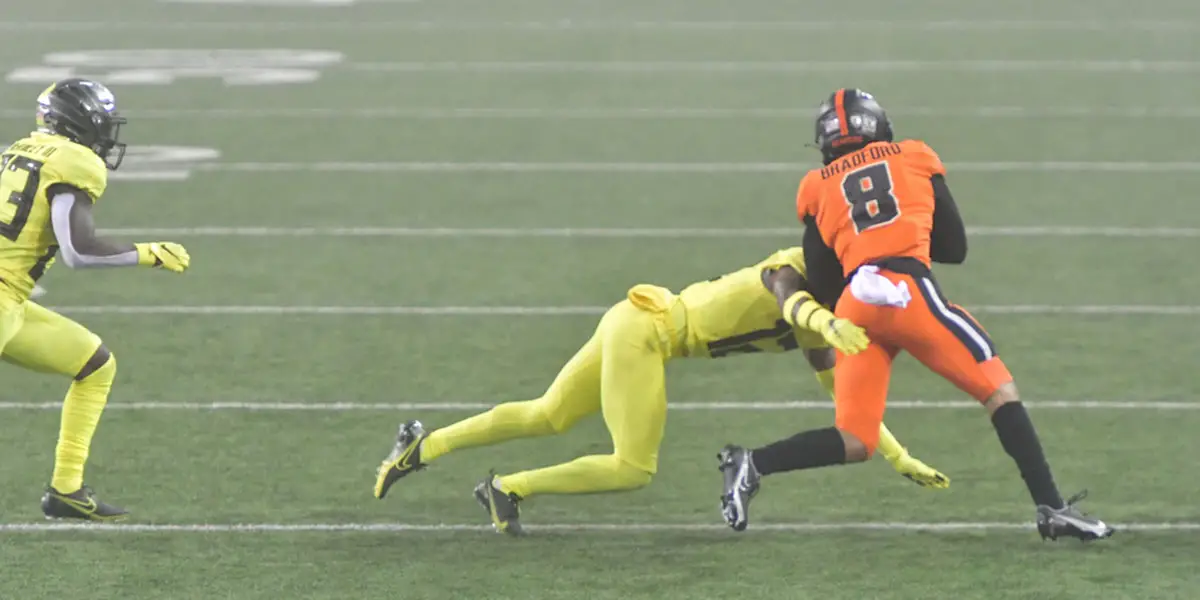After four ugly games, it’s safe to say Oregon’s defense has failed on every level. Oregon has the most talented roster in the Pac-12 on paper, and when you assess each player individually, this is true. However, football is a team sport, and instead of putting a cohesive defense on the field, Oregon has eleven players just running around.
A defense is so interconnected that one position group’s failure can result in cascading failures across the entire unit. If pass coverage doesn’t hold up, it is difficult for players like Kayvon Thibodeaux to get to the opposing quarterback, no matter how fast he is, because there is always somewhere the quarterback can throw the ball.
Thibodeaux is effectively the only pass rusher on the team. Occasionally, a linebacker blitz can put heat on the QB, but overall, the rest of the defensive line has been quiet. With the threat of only one pass-rusher in Thibodeaux, it is easy for an offense to neutralize him, because there isn’t any pressure coming from the rest of the defensive front seven. This lack of rush then requires an already struggling secondary to maintain coverage even longer, which results in Oregon’s defense being picked apart by freshman, back-up and mediocre quarterbacks.

The pass rush gets to the quarterback after the ball is out.
This doesn’t even begin to tackle the immense problem of Oregon’s lack of run defense, which requires defensive linemen to get enough push on the opposing line to help linebackers fill in the gaps and get tackles. There have been far too many long runs by opposing running backs, and many of those long runs have only been stopped by Mykael Wright sprinting across the field to save a touchdown.
Oregon’s defense is currently operating off raw athleticism, and this is not sustainable.
Lack of Leadership
The defense this year looks lost without any clear leader. We saw the impact the absence of a leader can have last year during the Ducks’ narrow victory over Washington State. In that game, Oregon was missing a key player, Troy Dye. Dye was the glue that kept that defense together. He was neither the biggest nor the most athletic player, but he was the heart and soul of the defense. Without their leader, that normally stout group surrendered 35 points to a mediocre 4-3 Cougars team and nearly lost. Dye has moved on from the Ducks, but what really hurts this year is the lack of player leadership. No one has stepped up to replace Dye.
Oregon’s defense this year is rebuilding when it should have been reloading. The COVID-19 pandemic and a delayed, shortened season have caused would-be returning veterans to opt-out for the NFL Draft, drawing a lot of valuable leadership experience away from the team.

Troy Dye played much of the 2019 season with his hand wrapped up and still made plays for the Ducks.
In the secondary, Oregon was originally looking at returning the entire unit. Unfortunately, due to the ongoing pandemic, Jevon Holland, Thomas Graham and Brady Breeze all opted-out. This was supposed to be a strength for the defense, and the rest of the defensive unit depended on this happening. Instead of working with an experienced secondary, Oregon has instead turned to players who would have realistically been backups this year. As backups, they would have still received valuable playing time but would not have shouldered the heavy load they do now as starters. They would have been able to grow into the Ducks’ defensive system and their respective leadership roles.
There are flashes of potential leaders on this young defense, though. Jamal Hill, taking over the nickel position from Holland, is growing into a leader for the secondary. Hill was unavailable during this last game against OSU, reportedly due to a minor injury. Against UCLA, Hill was starting to make his presence felt all over the field, which was a hallmark of both Breeze and Holland last year.
Young Linebackers Showing Some Promise
The secondary is such a disappointment because it was supposed to be one of the best in the country. The linebackers, on the other hand, were a group that fans and coaches alike knew would have fresh faces and probably make some freshman mistakes. There was a lot of excitement with the addition of five-star linebackers Justin Flowe and Noah Sewell. Flowe is out for the season with an injury, but Sewell has been a major bright spot for the linebacker corps.
Sewell is also becoming the de-facto leader of the linebackers as a true freshman. This isn’t inherently a bad thing, as Dye did the same when he was a freshman in 2016. However, outside of Sewell, the rest of the linebackers have failed to make a consistent game-changing impact. When Sewell went out against UCLA, Oregon’s defense felt his loss on the field. This is not a good indicator of the depth of the Oregon defense.

Noah Sewell makes a tackle for loss while Kayvon Thibodeaux fights a double team.
The Biggest Disappointment
Then, finally, that leaves the defensive line, which has performed far below expectations. This is a group that returned most of its starters and its star power in Thibodeaux and Jordon Scott. Thibodeaux recorded his first sack of the season last Saturday and has largely been neutralized in the passing game. He has faced constant double-teams but still has been by far the most effective player on the defensive line.
Thibodeaux can be seen rushing the quarterback on every passing down, but the quarterback is getting the ball out before he gets there. Where is the rest of the pass rush? To pressure the quarterback, there has to be pressure coming from multiple places in order to stress the offensive line and cause missed blocks, which become tackles for loss. This happened last year, but it simply isn’t happening this year.
The Fix
There isn’t a quick and easy fix for the disaster that is the Ducks’ defense. Nothing is currently working, and the failures of one unit are causing the failures of others. Coaches will most likely try to simplify the schemes and focus on fundamentals. And looking at Oregon’s tackling last week, this team does need to work on fundamentals.
A major change that needs to happen is player leadership. This team has the potential to be great, but the defense needs to start playing as a team. Who is going to lead this Oregon team on defense? Who is going to hold their fellow players accountable for mistakes and push them to be better?
David Marsh
Portland, Oregon
Top Photo By: Tom Corno
 Andrew Mueller, the FishDuck.com Volunteer Editor for this article, works in higher education in Chicago, Illinois.
Andrew Mueller, the FishDuck.com Volunteer Editor for this article, works in higher education in Chicago, Illinois.

David Marsh is a high school social studies teacher in Portland, Oregon. As a teacher he is known for telling puns to his students who sometimes laugh out of sympathy, and being both eccentric about history and the Ducks.
David graduated from the University of Oregon in 2012 with Majors in: Medieval Studies, Religious Studies, and Geography. David began following Ducks Football after being in a car accident in 2012; finding football something new and exciting to learn about during this difficult time in his life. Now, he cannot see life without Oregon football.


